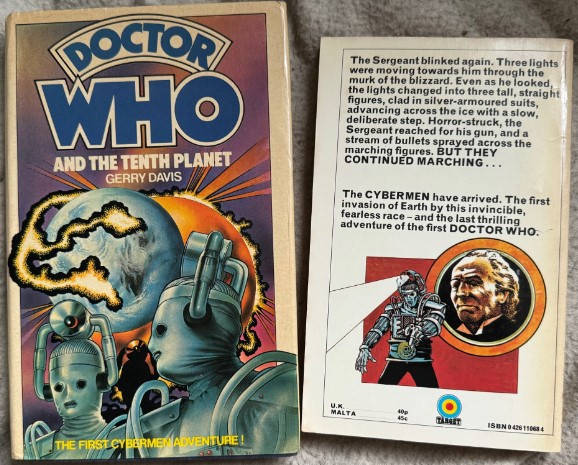Doctor Who And… 20: The Tenth Planet (19/2/1976)
Written by Gerry Davis, based on Kit Pedler and Gerry Davis’ scripts for the 1966 TV serial.

Like Doctor Who and the Cybermen, this begins with the Creation of the Cybermen prologue, before developing into something rather grim and tense (for a children’s book). It unfolds as a succession of races against time: first, to save the hapless Zeus Four astronauts from the effects of Mondas’ mavity; then to prevent Cutler from launching the Z-Bomb against Mondas, and finally, turning the tables, for the Cybermen to blow up Earth before Mondas itself disintegrates. And all the while, it seems even odds whether the Doctor will croak before the the Cybermen are defeated.
Characterisation is good: Polly is fearless and principled, butting heads with Krail, Cutler and anyone else who crosses her. Ben is practical and pragmatic, improvising his way out of tight corners and proving to be the hero of the story as his quick thinking in obtaining a Cyberman weapon foils the initial attack on Snowcap Base and later, his sabotage of the Z-Bomb and observation of the effects of radiation on the Cybermen ultimately defeats their invasion. In keeping with Doctor Who and the Cybermen, they are both said to come from the 1970s. At one point, Ben recognises a film clip of Roger Moore as James Bond (the film is The Man with the Golden Gun which I’d like to think is Davis amusing himself with a reference to Revenge of the Cybermen‘s glitter guns – we know Revenge is still on his mind, as in his earlier Cyberman novel, because the Cyberleader has a black helmet). Ben’s regret at killing a Cyberman and Polly’s distress at the upsetting destruction of Zeus Four are effectively contrasted with the Cybermen’s total disinterest in the astronauts’ fate.
The Doctor is less vividly drawn than Ben or Polly – which is deliberate. Davis makes more of his rapid ageing, his skin becoming translucent and his energy seeming to fade along with the Earth’s. He plays an almost advisory role, occasionally negotiating or providing insight, but is clearly ailing, and confiding in Polly, “It’s nearly time for a change”. Despite this set-up, when the regeneration comes it’s less vivid than the onscreen version which always disappointed me a bit as a kid, and still seems lacking in some of the magic of the Hartnell to Troughton transition.
As antagonists, the Cybermen are imposing when they need to be (though oddly undermined in a few point-of-view moments, such as the one that “gingerly” climbs down from its spaceship onto the South Pole). Cutler remains the bigger menace, as on TV, claiming “act first, think later” as his motto and living up to it – although there are hints of a more thoughtful person under this belligerent front, such as when he admits his fear of the Z-Bomb’s power.
The overall effect is compelling. I think this is a stronger novel than Doctor Who and the Cybermen, with a sustained mood of peril throughout. Grade 2.

Next Time: Doctor Who And… The Ice Warriors.
2 comments